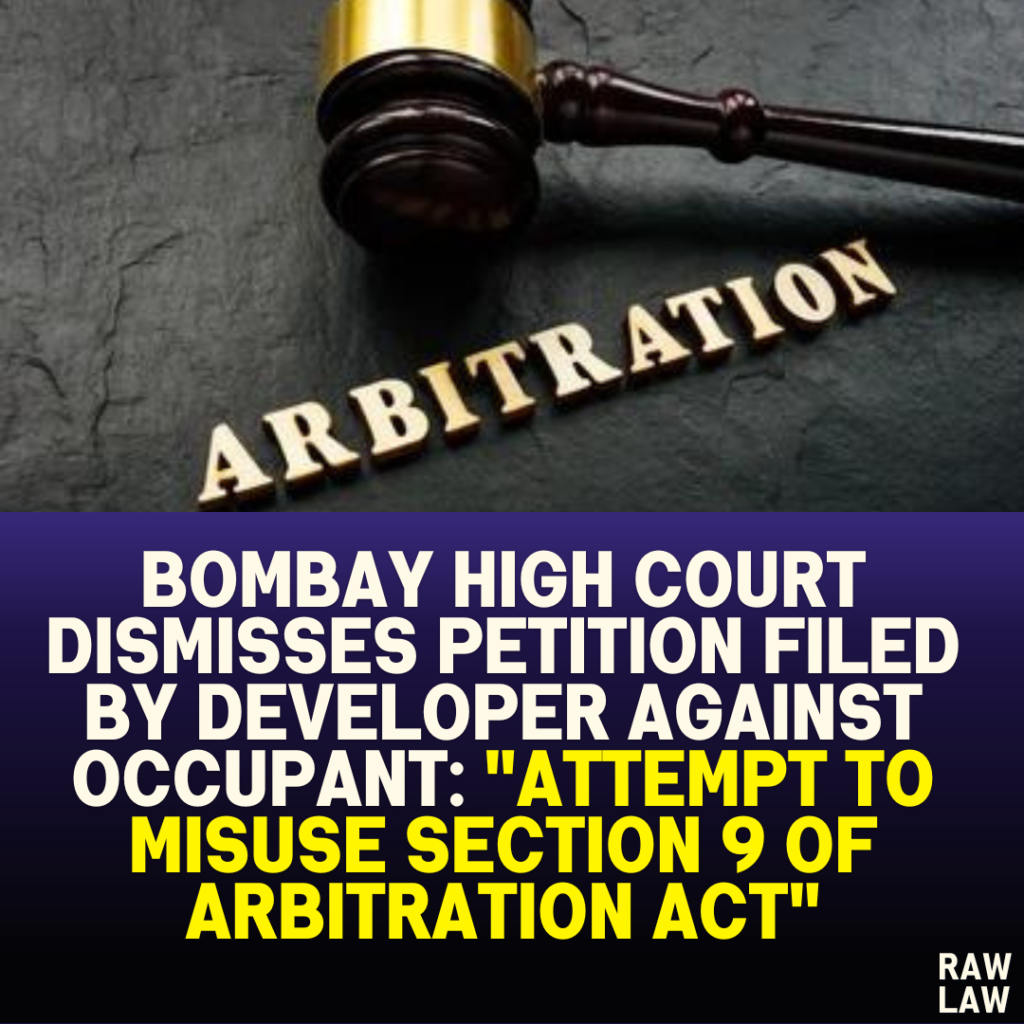Court’s Decision:
The Bombay High Court dismissed the petition filed by the developer under Section 9 of the Arbitration and Conciliation Act, 1996, against the occupant, holding that there was no arbitration agreement between the developer and the occupant. The court imposed costs of ₹5,00,000 on the developer, stating that the petition was a “complete and utter misuse of the provisions of Section 9 of the Arbitration Act.” The court concluded that the developer’s attempt to obtain reliefs against the occupant through Section 9 was frivolous and vexatious.
Facts:
- The dispute arose from a Redevelopment Agreement (RDA) and a Supplementary Agreement (SA) executed on 20th July 2022 between a developer (the petitioner) and a Cooperative Housing Society (the respondent society).
- The property in question includes a plot of land and a building comprising two wings: ‘A-Wing’ and ‘B-Wing’.
- The developer entered into the RDA and SA only with the society and its members; Respondent No. 2, referred to as an “occupant” of the ‘B-Wing,’ was not a member of the society and had not signed the agreements.
- In 2018, the society resolved to undertake redevelopment. The occupant did not cooperate, leading to delays. The society later obtained a deemed conveyance in 2020. The occupant contested this decision, and the matter is pending in a separate writ petition.
- The developer, having obtained all necessary permissions, approached the court seeking interim relief under Section 9 of the Arbitration Act to proceed with redevelopment, claiming rights over both ‘A-Wing’ and ‘B-Wing.’
- Respondent No. 2 argued that they held independent rights over ‘B-Wing,’ which had been separately assessed for property tax, had independent utilities, and had never been considered a part of the society.
Issues:
- Whether the developer, who was not in privity of contract with the occupant, could seek interim reliefs under Section 9 of the Arbitration Act.
- Whether the society’s deemed conveyance could bind the occupant who did not sign the RDA and SA.
Petitioner’s Arguments:
- The developer argued that with the deemed conveyance granted in favor of the society, there was no dispute regarding the society’s ownership of both wings.
- Submitted that the redevelopment agreement, signed by all society members, was legally binding on the occupant, who had not challenged the RDA and SA.
- Cited several judgments, including Choice Developers vs. Pantnagar Pearl CHS Ltd., Girish Mulchand Mehta vs. Mahesh S. Mehta, and Dem Homes LLP vs. Taruvel CHSL, to assert that the occupant could not stall the redevelopment.
Respondent’s Arguments:
- The occupant argued that there was no arbitration agreement between them and the developer, as the RDA and SA were only executed between the society and the developer.
- Claimed exclusive rights over ‘B-Wing’ and emphasized that the ‘B-Wing’ had always been treated separately by the society, with independent tax assessments and utilities.
- Highlighted that the RDA and SA used the term ‘occupant’ rather than ‘member’ in reference to their status, affirming that the agreements did not bind them.
- Contended that the redevelopment agreements were an attempt to dispossess the occupant without due process, and the developer had no legal basis to invoke Section 9 against them.
Analysis of the Law:
- The court observed that for any relief under Section 9 of the Arbitration Act, there must be an arbitration agreement between the parties, which was absent in this case.
- The court reiterated that Section 9 reliefs are interim measures in aid of arbitral proceedings, which presuppose a manifest intention to arbitrate. The petitioner’s lack of intention to initiate arbitration proceedings against the occupant was evident, making the invocation of Section 9 untenable.
- The petitioner’s reliance on judgments involving disputes between society members was held to be inapplicable, as Respondent No. 2 was neither a society member nor seeking membership.
Precedent Analysis:
- Choice Developers vs. Pantnagar Pearl CHS Ltd.: Held that interim measures under Section 9 can be directed against third parties in specific situations.
- Girish Mulchand Mehta vs. Mahesh S. Mehta: Stated that non-cooperative members cannot obstruct redevelopment if approved by a majority.
- Dem Homes LLP vs. Taruvel CHSL: Upheld that minority members must comply with majority decisions in redevelopment agreements.
However, the court distinguished these cases as Respondent No. 2 was not a member and there was no privity of contract.
Court’s Reasoning:
- The court highlighted that the occupant had never signed the RDA and SA, nor were they bound by any arbitration agreement.
- Stated that the petitioner’s attempt to enforce an agreement solely between the society and its members against a non-member was a misuse of Section 9.
- Emphasized that issues of title and ownership cannot be conclusively determined under a deemed conveyance order and must be resolved through appropriate proceedings.
Conclusion:
The court dismissed the petition, holding that the petitioner, having no privity of contract with Respondent No. 2, could not seek reliefs under Section 9 of the Arbitration Act. It directed the petitioner to pay costs of ₹5,00,000 to the respondent for instituting frivolous proceedings.
Implications:
The judgment reaffirms that interim relief under Section 9 of the Arbitration Act cannot be sought against parties who are not bound by the arbitration agreement. This decision clarifies the scope of Section 9 and prevents its misuse in property disputes involving redevelopment agreements.
